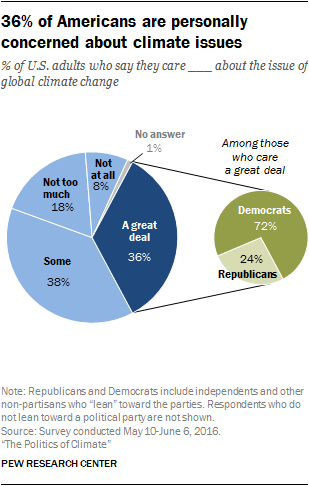I recently got an internship in a research lab, which is really exciting, especially as a first-year student. The lab centers around land-atmosphere interactions and has a focus on carbon emissions and fluxes. Whenever I tell someone that, it almost immediately sparks a climate change conversation. Don’t get me wrong, as a meteorology major, climate change is an extremely prevalent issue to me. It is something that people assume that I am some kind of expert on when they hear my major. However, I’ve never really been able to understand why there is such a debate about climate change and why it is so polarized based on people’s political views. I wondered why my scientific research had an inherent political association that went along with it, while my friends that are doing other types of research did not find themselves in the same situation.
One of the interesting things about the issue is that the politics that hover over climate change really only exist in the United States. 99% of world leaders and 99.5% of scientists agree that something needs to be done to prevent human-caused climate change. Though it is based upon actual scientific data, the issue of climate change has become just another aspect of the polarizing two-party system in the US. Disagreeing about climate change has just become another dividing factor for the two parties, as opposed to something that people consider based on real data. Additionally, the frequently-used argument that there is disagreement within the scientific community as to the existence of climate change is also a misconception. The more research that is done, the more obvious and irrefutable the results become.
Climate change is a problem that is affecting everyone, whether or not they want to admit it. Even some governments in predominantly Republican states have begun running initiatives generally regarded to prevent climate change. However, they instead labeled them as initiatives meant to help things like economic development, resource management, or public health. The governments recognize that these are common values that next to no one would oppose, unlike the underlying environmental protection efforts that would be immediately shot down as soon as the communities heard the phrase ‘climate change.’ The citizens therefore appear to be in support of these initiatives, but they are unaware of their true intentions.
A recent study found definitively that news coverage of climate change is completely dominated by partisan division and the two sides tell very different stories about it. While prior to 2000, the majority of climate change articles from major news sources cited and mentioned scientists, starting in the early 2000s, more politicians than scientists were explicitly mentioned. This simply does not make sense when climate change is a scientific issue at its core, not a political one. Instead of serving as some kind of political litmus test, climate change should be regarded as a valid scientific issue–and one that will continue to negatively affect us more and more if we do not make an active effort to prevent it.

